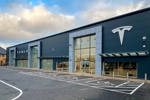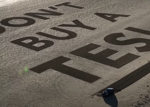The reasons were obvious: the remarketing of loan and leasing cars, selling more motor finance and fully utilising customer databases.
But critics have speculated over the amount of control banks exert in the operational side of the business, while some suggest that as soon as sales fall and profits tighten they will look to pull out.
Dutton-Forshaw managing director Maurice Rourke says the Lloyds TSB board has “very little” involvement in the retail business.
“Lloyds TSB looks at our performance and that of its other automotive interests and how it all fits together and we get support in areas like health and safety and the FSA rules but it has no involvement in the day-to-day running of the business.”
Rourke was brought in by Lloyds TSB Group in August 2002 to oversee its strategy of acquiring a car retail business. At that point it had identified several potentials, but hadn’t fixed on a final target. The company already had a sizeable presence in the automotive sector through Autolease, the UK’s largest leasing fleet, and Black Horse, the largest finance provider.
“It was logical that if it was financing them, hiring and leasing them, why not sell cars as well,” says Rourke. “It also had a large customer database to work with.”
Biggest challenge
In December 2002, Lloyds TSB paid £48.7m for the Dutton-Forshaw business. It was an obvious choice because owner CVC, the venture capitalist which bought the business in 1997, wanted to exit and chief executive Robbie Robinson wished to retire.
It wasn’t a smooth transfer: Jaguar, Land Rover and Audi wanted out, so Rourke’s next task, which he describes as his biggest challenge, was to sell those 11 sites.
Although the decision was against Dutton-Forshaw’s wishes, it chose not to be obstructive, selling each site to the carmakers’ preferred choice – except, that is, the Audi showroom in Battersea, London.
Dovercourt Audi is a landmark site for the group sitting adjacent to Dovercourt VW. Rather than sell to a rival, Rourke transformed it into an authorised aftersales outlet, exploiting the block exemption rules which allow him to also sell delivery mileage pre-registered and used cars from the site.
The business has gone from strength to strength and the outlet’s registered vehicle sales now total two-thirds of the volume of new cars sold when it was a franchised dealership.
“There’s nothing worse than having to sell a business if you don’t want to sell, especially the people issues. We had a lot of long serving staff at the other sites and I was disappointed for them – some were on final year salary pensions,” Rourke says.
“But on the positive side, it made us more determined to get the group back to where it was. And we acted in a professional, businesslike way when we sold the sites because what goes around comes around and I hope those manufacturers will remember that if we look at those brands again.”
The £20m difference
Dutton-Forshaw offers Lloyd TSB its fourth route to market for ex-fleet cars, complementing the two Black Horse-branded used car supermarkets in the Midlands, CarSelect web business and Cars for Staff scheme.
Through these channels Lloyds expects to sell up to half the 60,000 cars de-fleeted each year instead of sending them to auction. “We can make an extra £700 per car on top of an auction price, so it makes a big difference,” says Rourke. That difference could be worth more than £20m.
But Rourke refutes any suggestion that the group is protected against any market downturn by its relationship with Lloyds. “There are synergies and we will make money with Autolease, but they have the best buying terms in the UK, so the margins are very slim,” he says. “It’s a bit of cream, but it doesn’t make the business.”
The main benefit comes behind the scenes – assistance with health and safety regulations and other legislation, in particular the recent FSA insurance rules. As for exclusivity on finance, Dutton-Forshaw did change its secondary finance provider from Capital Bank to Black Horse, but it stresses carmakers receive the same level of support as at any other retailer.
Rourke believes the market is changing. Cars are more affordable than at any time in the past and build quality means they go wrong less often. It’s creating unique challenges and requires a new approach to sales and marketing.
In recent years this task has been simplified by rapid improvements in technology, falling prices and a strong economy.
The market has been insulated, but sales have been under pressure for the past eight months from a combination of last year’s interest rate rises and this year’s stagnating housing market, although March forward figures are looking more optimistic.
Despite this pressure, Rourke predicts that with the right conditions new car sales could burst through the 3m mark. It’s a view shared by pundits such as Professor Garel Rhys of Cardiff Business School.
Reducing overheads
“There is still potential for substantial growth,” Rourke says. “Cars have never been cheaper and with the Chinese coming in three to four years’ time, even more pressure will be put on prices.”
Improved quality and innovations have wider implications, such as longer service intervals and fewer repairs in an area of the market that for some retailers accounts for more than half their profits. The new VW Passat, for instance, will have its first service after 19,000 miles – and that will only take an hour or so.
While lamenting the lost work, Rourke believes there is an opportunity to reduce overheads. “Because servicing will only take one to two hours we have an opportunity to book people in and do the work while they stay at the dealership,” he says. “This has been tried before by other retailers but the timing was wrong; going forward this is the right way.”
Dutton-Forshaw is already planning to incorporate the concept in the Mercedes-Benz MAC in Kent, acquired last year from Whitehouse Group, where it is building two new dealerships and refurbishing a third (total MAC investment in fixed costs will be up to £25m).
Crucial to its success will be providing customers with a quiet area with phone and internet access which they can use as a temporary office. “We might even give them secretarial support,” Rourke adds.
“This idea would reduce our service cars and solve the problem of people never getting the same sort of replacement car while theirs is being serviced. It would also free up parking space as long as we get the booking process right.”
And he believes it is just as relevant for volume makes as premium: “Fleet customers would benefit from that level of organisation and efficiency.”
The 30-site Dutton-Forshaw group is looking to grow to 40-50 dealerships over the next 18 months. That number relates to the number of brands with which Rourke believes he can establish a new relationship – four – and the scale he wants to have with each – typically three or four outlets – plus a few additions with existing partners.
Rourke predicts further moves towards market areas, either prompted by carmakers or the dealers themselves.
The catalyst for Dutton-Forshaw’s next big expansion surge will be the end of the location clause in October. Rourke expects a significant shake-up of the market with retailers entering cities where there are underperforming dealerships.
“The best defence is to concentrate on doing your business very well,” he says. “Then we have to make our customer experience unique – to offer something that separates us from the rest.”
Analyst’s view
Analyst and consultant Piers Trenear-Thomas believes Lloyds TSB’s acquisition of Dutton-Forshaw could create conflict if the two companies disagree on which franchises to buy.
But he agrees with the policy of expansion.
“They are in need of acquisitions – the group is smaller than it was planned to be post acquisition by Lloyds TSB and needs to return to scale,” he says. “But Lloyds just wants one of each franchise to secure supply while D-F needs scale – will there be strategic tension?”
Trenear-Thomas says strengths include the fact that D-F feeds the Autolease empire, and its access to cheap capital. And he adds: “It also has a very tight management team.”















Login to comment
Comments
No comments have been made yet.